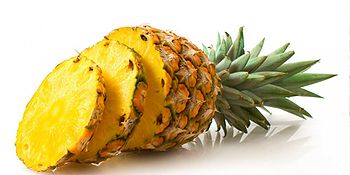Pineapple
Other Names : Ananas Comosus, अनन्नास Anannas, अननस Ananus, அன்னாசி Anasippazham, Kaitachchakka, Ananas, అన్నసపన్దు Annasapandu, Anasahannu, Ananasu hannu, অনন্নাস Anannas, अननास, बहुनेत्रफलम् Bahunetraphalam, Anamnasam, আনাৰস Anarash , La-khuih-thei, Chingomthei, Ананас, 菠蘿
See also : Bromelain
Special Precautions of Pineapple
- Unripe Pineapple : Eating the fruit or drinking the juice of an unripe pineapple can be extremely dangerous. In fact, the Drugs.com website explains that it's quite toxic to humans, often causing excessive diarrhea and severe vomiting.
- After eating a large amount of pineapple, you might experience swelling or tenderness on the lips, inner cheeks and tongue. Typically, this reaction is caused by pineapple's meat-tenderizing properties, and it should resolve itself within a few hours. However, if the swelling is accompanied by a rash, hives or difficulty breathing, it could indicate a pineapple allergy. In this case, stop eating and seek medical attention immediately.
- Taking in too much vitamin C is generally quite safe. As a water-soluble vitamin, excess vitamin C is generally excreted through the urine. However, extremely high doses of vitamin C can cause diarrhea, nausea, vomiting, abdominal pain, heartburn, headaches and insomnia. Taking in too much of the fruit's bromelain can result in skin rash, vomiting, diarrhea and excessive menstrual bleeding. Large doses of the enzyme could also stimulate uterine contractions, potentially leading to miscarriages in pregnant women.
- The bromelain in pineapple could potentially interact with certain medications. The University of Maryland Medical Center recommends consulting your physician before eating pineapple or taking bromelain supplements if you are currently taking antibiotics, anticoagulants, anticonvulsants, barbiturates, benzodiazepines, blood thinners, insomnia drugs and tricyclic antidepressants. Alcohol and certain herbs, such as valerian root or kava, might also interact with bromelain.
- Most common side effects associated with bromelain include nausea, diarrhea and indigestion. Other side effects include tachycardia, fatigue and heavy menstruation. People with allergies to pineapple should avoid bromelain. Allergic reactions may also occur in people who are intolerant to celery, fennel, carrot, papain, & latex. People with peptic ulcers should not use bromelain either.
The benefits of Pineapple are
Pineapples have long had a tradition for their healing qualities among the natives of Central and South America. Bromelain is a powerful proteolytic enzyme from the juice and stems of pineapples. It is very helpful for aiding the digestive processes. It has also shown very powerful anti-inflammatory properties that have caught the attention of nutritional researchers. Bromelain can refer to either of 2 enzymes: Stem Bromelain and Fruit Bromelain. These are referred to as sulfhydryl proteases since a cysteine side-chain of free sulfhydryl group is present in the structure. The stem form is the most common commercial source due to the wide availability after the fruit is harvested. (1-2). Bromelain has been used as a therapeutic supplement since 1957. Research was first conducted in Hawaii but has now spread around the world. Germany is the most involved in research on this unique nutrient. Bromelain is currently the thirteenth most used herbal supplement in Germany.
- Bromelain has shown through a number of research studies to be effective at modulating inflammation and lessening the severity of a number of inflammatory based diseases. These include multiple sclerosis, pleurisy, arteriosclerosis, osteoarthritis, ulcerative colitis, rheumatoid arthritis and allergic asthma.
- Bromelain is also great at relieving sinus congestion. Bromelain has been shown to ease congestion, reduce nasal mucous and heal areas of swelling by mediating the inflammation caused by infection or hay fever. The German Commission E approved bromelain for the treatment of sinus and nasal swelling following ear, nose, and throat surgery or trauma.
- Bromelain has been shown to remove certain CD128 receptors for interleukin-8 (IL-8). IL-8 is an immune cell that stimulates neutrophil activation. Increased neutrophil activation is associated with increased inflammation. By modulating the receptors for IL-8, bromelain helps control this immune reaction. Other studies have shown bromelain to effectively reduce other known inflammatory prostaglandins, cytokines, and chemokines.
- Bromelain has shown itself to be comparable to strong anti-inflammatory drugs such as dexamethasone and non-steroidal anti-inflammatory agents (NSAIDs). While these medications can be addictive and have very dangerous side effects, bromelain is non-addictive and side effects happen less often than what occurs with these medications.
- Cellulite : Bromelain helps break down fibrin buildup in fine blood vessels, which has a beneficial effect on blood circulation to the skin. Be aware, however, that most of the bromelain in pineapple is in the stem which is not as tasty as the flesh but which is nevertheless edible.
Main Combinations
- Cellulite :
- Pineapple + Meadowsweet + Birch + Wine Pomace + Green Coffee
- Green Coffee + Pineapple + Wine Pomace
- Overweight + Cellulite : Pineapple + Mate + Meadowsweet + Birch
- Sprains + Strains : Pineapple + Harpagophytum (and Cherry Stems in case of edema)
- Sprain, Strains (with Edema) : Cherry Stems + Harpagophytum + Pineapple + Birch
